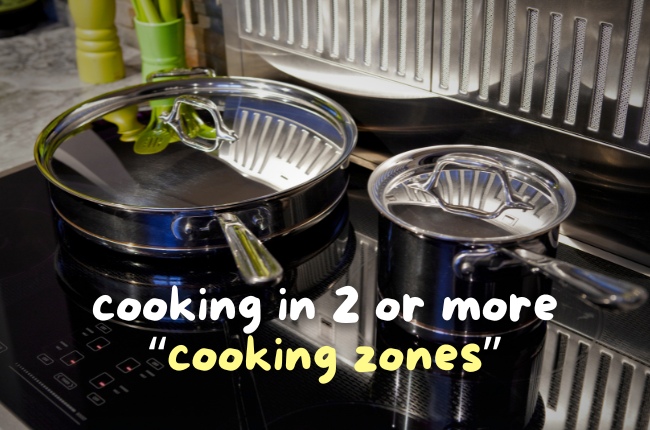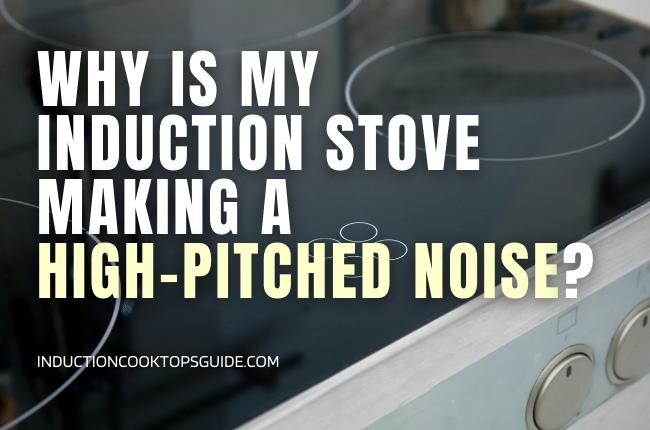Induction stoves have been a game changer in the modern kitchen. They boast a lot of features that take your average home kitchen and upgrade it into the best version of itself.
One of the things people love about induction stoves is the sleek look–usually finished with glass and an effortless aesthetic.
But more than its form, functionality is where induction stoves take the cake.
When paired with the right kind of cookware, they heat more evenly than your average gas or electric cooktops.
Besides that, they’re also a great choice for maintaining a safe kitchen because, without compatible cookware, the heat won’t transfer. So, you don’t have to worry about accidental burns or grease fires when you cook with an induction stove in your kitchen.
But alas, no stovetop is going to be entirely perfect. Despite its highly promising functionality and efficiency in cooking, the induction stove does have a few hang-ups.
One of the most infamous ones is hard to ignore. It’ll leave your ears ringing for quite a bit.
Yes, induction stove tops have occasionally been reported to be a little loud.
For regular noise, check out: Do Induction Cooktops Make Noise?
Why is my induction stove making a high-pitched noise?
Have you found yourself saying, “My induction cooktop hurts my ears!”. Well, don’t worry because it’s not just you experiencing this.
Induction cooktops can make different kinds of sounds.
First, you’ll have to listen carefully to hear if this sound is just a normal one to be expected of an induction cooker or if it’s something of concern.
Usually, the typical sounds an induction cooker makes resemble buzzing or clicking sounds. They’re usually pretty dull sounds that drone on. Typically, you manage to drown them out or forget about them after a while.
These sounds — the dull humming or buzzing — are normal for induction cookers. These usually have something to do with the magnetic fields needed for the cooker to work.
However, high-pitched noises have been reported by a lot of induction stove users.
Not only are these more annoying than your typical induction cooker hum, but they can also indicate some changes you can make to have a smoother experience with your stovetop.
So why is my induction hob whistling?
Well, there can be a handful of reasons your induction cooker is whining or emitting high-pitched sounds.
These can be attributed to the power source, the cookware you use, or other factors.
1. Power Source Failure
Be very careful when you start hearing a high-pitched sound coming out of your induction cooker. It could be a sign that there are voltage issues affecting your stove.
Specifically, this could be an issue with a transformer not being able to supply the correct electric power to your stove.
If you haven’t completely ruled this out yet, it’s best to stop using your induction cooker in the meantime. While it usually is a pretty solvable problem, there have been cases where a faulty power source can cause explosions and fires.
So in this scenario, better be safe than sorry!
It’s also best to get your stove checked out by an electrician or a similar expert before moving on to other possibilities.
2. Cookware
Have you ever noticed the high-pitched noise when you’re busy multitasking on your stove? Well, this might actually be the root of your problem.
Sometimes, cooking in two or more different zones at the same time, using cookware of different materials, can produce a sharp, high-pitched buzz.

But how is that possible? It doesn’t usually happen on gas stoves or electric.
Why does it matter when you use two different kinds of cookware on an induction stove?
It’s all in the material. Induction stoves work great because they don’t just transfer heat directly to the surface of the pots or pans you use.
Instead, to get a significantly even heat across your cookware, it sends electromagnetic waves through the metal, leading the heat on a sort of path. This path ensures that your pan doesn’t have a hot or cold side.
But because of these magnetic waves or currents, the force it produces causes molecules in your pan to vibrate or move around. This is what gets them all nice and hot, but it can also cause them to make sounds.
So, wait, what does the material have to do with this?
Well, different materials react differently to the magnetic forces of the induction stove.
Generally, lighter pans, like those made mostly of aluminum, are the usual suspects for making a lot of noise.
Multi-ply cookware can also cause high-pitched buzzing because the different layers of metal can move around a lot internally, causing the sound.
This can also be the case if the pot or pan you use is too small and doesn’t fully cover the surface of the induction stove top.
3. Heat Settings
Naturally, higher heat settings are going to require more of the electromagnetic force produced by induction cookers.
This means that the vibrations that make the stove work will increase. Overall, this would cause the high-pitched sounds to intensify the higher the heat applied.
How do I stop my induction cooktop from making noise?
Now that you know the potential sources of your ear-splitting problem, it’s time to figure out ways to stop it.
It’d be a shame to have a stovetop that you love for its efficiency and looks ruin your kitchen experience because of an annoying, shrill sound.
But you’ve probably figured out by now that, for the most part, the solution isn’t really that complicated!
Here are a few things you can do to stop your induction cooker from making high-pitched noises:
- Check your power source. As mentioned previously, this is the possible source of the sound that poses the most risk to you.
Most likely, it will be a minor issue like a dead burner or a faulty transformer that can be replaced. But it can also tell you that there’s a bigger threat around that might cause electric fires. So always check if your power source is the cause of the problem. - Add some food to your pan. Sometimes, the solution can be as simple as this! If you find it unavoidable to use lightweight metal cookware on your stove, weighing it down with more food should keep it from vibrating too much and causing that loud whistling noise.
- Switch to cast iron. Cast iron really is the gold standard when it comes to induction cooking. Besides being compatible with just about any induction cooktop, the heavy material prevents the noise from happening in the first place.
- Use a lower heat setting when cooking. If your recipe doesn’t call for high heat, it’s best to keep the heat setting to a low or medium level to prevent the noise.
- Experiment with what works for you! All induction stoves are different. Your pots and pans are also going to be different. Some of them have the slightest difference that could cause the noise to happen.
It could be the material of your cookware, small warps that you might not be aware of, etc. But the best way to know your induction cooker better is to play around with different kinds of cookware in different positions and even try to use them on all types of heat settings to find that sweet spot for you.
FAQs:
Why is my Duxtop induction cooktop making noise?
Duxtop is a pretty common brand when it comes to induction products. They’re easily accessible online, and even chefs swear by them.
But they function just like any other induction cooktop. The Duxtop induction cooktop high-pitched noise is not a problem that’s only exclusive to this brand.
So, you’ll just have to deal with the issue like other induction cooker brands — check your energy source, cookware, and temperature settings.
Conclusion
So, if you find yourself in a rut because your new induction cooker would’ve been perfect if not for the noise, don’t stress! It’s usually a very simple, solvable problem.
Just remember to get to the root of the problem, make sure you have a secure source of electricity, play around with your cookware and regulate the heat.
And pretty soon, it’ll be you whistling a happy tune as you enjoy cooking on your induction stove.

Leave a Reply